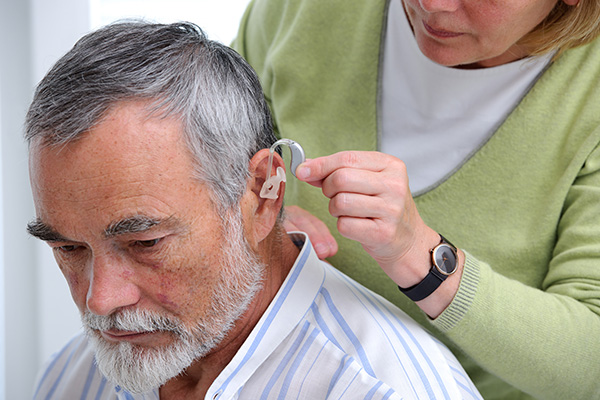How Does an Audiologist Conduct a Hearing Test?
A hearing test gives you the opportunity to determine whether you’re

Given that roughly one in five Americans suffer from hearing loss, it’s probable that at least one person you love will struggle with an associated condition. When you do have a friend or relative that has reduced hearing, supporting them in any possible manner should be high on the agenda.
While there is no one right or wrong answer, here are some of the best solutions.
Visiting the audiologist is a little scary at any stage of life. However, it’s particularly daunting for somebody that knows that an issue will be identified. In addition to the fears of learning that their hearing is even worse than they thought, there is the embarrassment of not being able to understand what the audiologist is saying.
Having you by their side on the day of their hearing examination can be very comforting on an emotional level while also adding a practical element as you can relay any missed information once you leave the audiologists. Better still, when trying hearing aid types, you can give your opinions about what looks good or not.
On a separate note, it’s never a bad idea to get your hearing tested at the same time.
Preparing for the hearing examination in style is a vital responsibility. The more knowledge that your loved one has before entering the audiology center, the more comfortable the appointment will feel. Playing an active role in the preparation phase by encouraging them to learn more while showing a personal interest is key.
Knowing what to expect from the appointment is very important. The different types of hearing tests include pure tone testing, tympanometry, speech testing, and bone conduction testing. It’s also vital to know the basics of in-the-ear, behind-the-ear, and receiver-in-canal hearing aids. While the audiologist will provide clarity, it’s good to have a foundation of knowledge.
You should also ensure that your loved one avoids exposure to loud noise for 48 hours too.
Whether the hearing loss has been sudden or gradual, your loved one will struggle to cope with the changes. Those physical regressions and challenges can also pose a threat to their mental health too. It will be a very difficult time in their life, which is why you should be there to provide emotional and moral support at all times.
Being ready to listen to their fears and concerns before, during, and after the diagnosis is vital. Patience is particularly crucial at this time. Your loved one may go through denial, anger, guilt, fear, sadness, confusion and loneliness before truly coming to terms with the situation. You should show that you care throughout every step of the process.
Proving that they do not have to face this battle alone is truly the greatest gift of all.
A loved one’s hearing loss will inevitably affect the communication link that you share. Brushing up on your communication skills can make a significant difference for both parties. While this won’t remove all of the limitations that their hearing loss brings, it will allow you to keep having meaningful conversations.
Maintaining eye contact and avoiding distractions is vital. Meanwhile, keeping your mouth uncovered, learning to rephrase rather than repeat, and avoiding exaggerated lip movements are all critical steps too. Simple tips like saying their name to get their attention or informing them about a proposed change of topic can be very useful also.
Master your communication skills, and life will be less stressful for both of you.
Your direct input can have a significant influence on your loved one’s life for many years to come. However, this transitional phase is the most difficult by far, which is why it deserves extra attention. Realizing that you cannot manage every aspect on your own is essential if you wish to make this period of their life a little less stressful.
In many cases, communication with other people going through similar issues can be very comforting. Whether it’s finding local support groups or an online facility doesn’t matter. Any support of this kind can make a world of difference. Meanwhile, helping your loved one find hobbies where hearing isn’t essential can be comforting too.
Hearing loss will influence their life, but it needn’t dictate it.
Ultimately, a correct diagnosis and management plan is essential for anyone with hearing loss. Visiting Tops Hearing & Balance Center is the best way to make it happen. To learn more, call us at 281-920-3911 today.

A hearing test gives you the opportunity to determine whether you’re

Do you find that you often have to ask for people to repeat what they are

Hearing loss is something that affects around 20% of the population of the